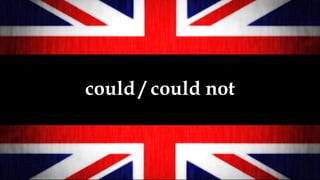Could (not)
•Download as PPTX, PDF•
0 likes•1,350 views
Uitleg over could en could not
Report
Share
Report
Share

More Related Content
Viewers also liked
Viewers also liked (9)
REFLESS Project - Languages at Soton - stages and structures

REFLESS Project - Languages at Soton - stages and structures
More from English Grmmr
More from English Grmmr (20)
Could (not)
- 1. could / could not
- 2. could / could not could Gebruik: zou kunnen Vorm: could wordt altijd gevolgd door het hele werkwoord. I could look on the Internet. Perhaps you could send an e-mail.
- 3. could / could not could Gebruik: zou kunnen Vorm: could wordt altijd gevolgd door het hele werkwoord. I could look on the Internet. Perhaps you could send an e-mail. could not (couldn’t) Gebruik: zou niet kunnen Vorm: could not wordt altijd gevolgd door het hele werkwoord. I couldn’t do that. He couldn’t afford it.
